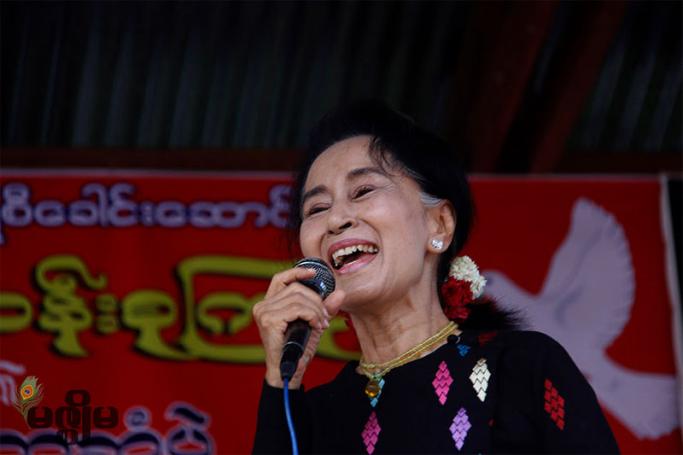In her first interview to an Indian media organization after nearly three years, Myanmar opposition leader and Chairperson of the National League for Democracy Aung San Suu Kyi has forcefully asserted that she will lead any government her party forms regardless of whether she is President or not.
In the 53 minute interview to be broadcast tonight, Wednesday the 7th, at 7.45 p.m. Aung San Suu Kyi speaks extensively about her concerns regarding the forthcoming Myanmar elections, her election strategy, the role she sees for herself, the reforms her party is committed to and how she will tackle challenges such as the ethnic situation, the increasing role of religion in politics and the need to tackle poverty.
Speaking at her lakeside home in Yangon, Aung San Suu Kyi told the India Today TV programme ‘To The Point’: “I have made it quite clear that if the NLD wins elections and we form a government I am going to be the leader of that government, whether or not I am the President.”
When asked how she would be the leader of the government if she was not President she replied, “Why not? Do you have to be a President in order to lead the country?” adding, “. . . [The] Leader of the NLD government will have to be me because I am the leader of my party.”
She also told the programme that “she has a special affection for India” and has put India’s past treatment of her behind her. She said that the present state of India-Myanmar relations is “not bad”. She added,
“It’s an improvement on what it was 3-4 years ago when India was overcautious with regard to support for the democracy movement in Myanmar. In fact, they tried to keep away from us … that saddened me because I have a special affection for India. Indian and Myanmar leaders have been close friends since the days before independence. It’s saddened me that India, the largest democracy in the world, was turning its back on democracy in order to maintain good relations with the military government. But things have changed. Partly because of changes here and perhaps because of changes in India itself … somehow I am always confident we will always be friends, good friends, who will be able to help one another … the past is there just for us to take lessons from it. Not to be angry or resentful.”
Speaking about China, Aung San Suu Kyi said that Myanmar and China relations “will be good” if she comes to power. She then pointedly went on to talk about India and China together, saying,
“We have a long history of maintaining good relations with India and China. Particularly immediately after independence. That was very much our foreign policy. Myanmar was one of the first countries in the world to recognize the Communist government of China at a time when we were extremely friendly with India.”
Speaking about herself and whether she is ready for the challenge of ruling Myanmar Aung San Suu Kyi said it was “a daunting challenge”. But when questioned whether she has doubts or apprehensions in the solitude of her room she replied,
“It’s a daunting challenge. I don’t think like that only when I am alone in my room. It’s a daunting challenge. I accept that. That’s why we have to be ready to face it … I hope (the challenge) brings out the best in me. I don’t think I can say I am apprehensive. I take things one step at a time … if you take it that way you are not apprehensive. You become very practical and down to earth.”
Speaking about many of her Western supporters, who have looked upon her as an icon but are now disillusioned because of her silence on the Rohingya issue as well as her reluctance to criticize Buddhist nationalism, Aung San Suu Kyi said she had always been “a pragmatic politician,”adding, “I don’t like to be called an icon, because icons do nothing except sit on a wall.”
“They only regarded me as an icon after I became actively involved in politics, after my release from house arrest. They hadn’t actually treated me as an icon before that. There was much more interest in me after I was released than during the days I was under house arrest.”
Aung San Suu Kyi also suggested that her critics in the West had changed their criteria for judging her in an almost contradictory way.
“Previously, when I was under house arrest, I was criticized for not being flexible enough. There were quite a few critics who said if only I hadn’t taken such a tough stand then I would have got on better with the military government. Now they are saying exactly the opposite, that I am not tough enough. I am not taking a strong enough stand. But then that is what politics is like and that is what the media is like.”
Aung San Suu Kyi affirms she will lead Government if NLD wins
07 October 2015
Aung San Suu Kyi affirms she will lead Government if NLD wins












